同源形容词与副词的区别 容易混淆拼错的词
常见病句类型形容词和副词混淆
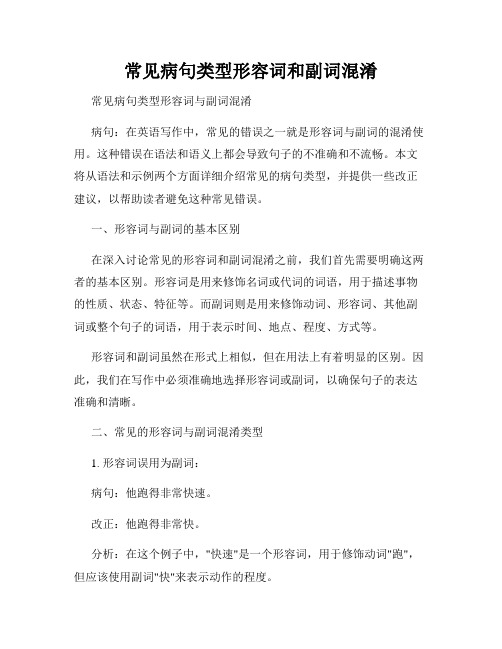
常见病句类型形容词和副词混淆常见病句类型形容词与副词混淆病句:在英语写作中,常见的错误之一就是形容词与副词的混淆使用。
这种错误在语法和语义上都会导致句子的不准确和不流畅。
本文将从语法和示例两个方面详细介绍常见的病句类型,并提供一些改正建议,以帮助读者避免这种常见错误。
一、形容词与副词的基本区别在深入讨论常见的形容词和副词混淆之前,我们首先需要明确这两者的基本区别。
形容词是用来修饰名词或代词的词语,用于描述事物的性质、状态、特征等。
而副词则是用来修饰动词、形容词、其他副词或整个句子的词语,用于表示时间、地点、程度、方式等。
形容词和副词虽然在形式上相似,但在用法上有着明显的区别。
因此,我们在写作中必须准确地选择形容词或副词,以确保句子的表达准确和清晰。
二、常见的形容词与副词混淆类型1. 形容词误用为副词:病句:他跑得非常快速。
改正:他跑得非常快。
分析:在这个例子中,"快速"是一个形容词,用于修饰动词"跑",但应该使用副词"快"来表示动作的程度。
2. 形容词形式错误地使用在动词后面:病句:我完全同意你的观点。
改正:我完全地同意你的观点。
分析:在这个例子中,"完全"是一个形容词,用于修饰动词"同意",但应该使用副词"完全地"来修饰动词。
3. 形容词用于修饰名词时,应注意其位置和用法:病句:这是一个异常优秀的表现。
改正:这是一个异常出色的表现。
分析:在这个例子中,"优秀"是一个形容词,应该放在名词"表现"之前。
另外,"异常"作为副词表示程度,在这里更应该使用副词"出色"来修饰形容词。
三、如何避免形容词和副词混淆的错误1. 加强语法知识的学习:了解形容词和副词的基本定义和用法,包括它们在句子中的位置和修饰对象,以便正确选择和使用。
易混淆的同源形容词和副词
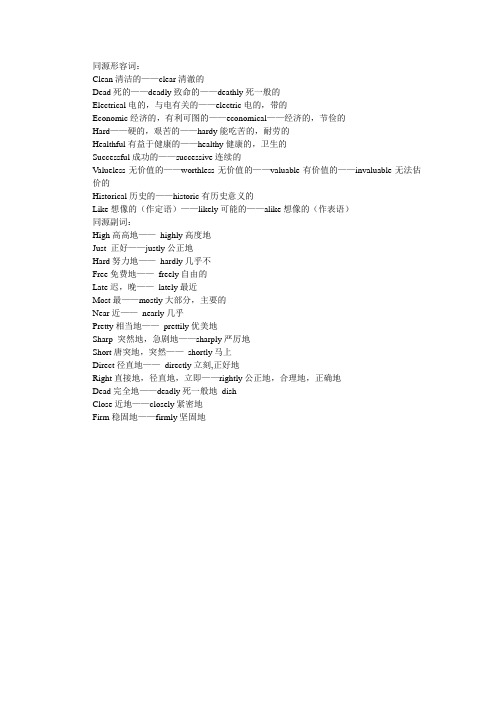
同源形容词:
Clean清洁的——clear清澈的
Dead死的——deadly致命的——deathly死一般的
Electrical电的,与电有关的——electric电的,带的
Economic经济的,有利可图的——economical——经济的,节俭的
Hard——硬的,艰苦的——hardy能吃苦的,耐劳的
Healthful有益于健康的——healthy健康的,卫生的
Successful成功的——successive连续的
Valueless无价值的——worthless无价值的——valuable有价值的——invaluable无法估价的
Historical历史的——historic有历史意义的
Like想像的(作定语)——likely可能的——alike想像的(作表语)
同源副词:
High高高地——highly高度地
Just 正好——justly公正地
Hard努力地——hardly几乎不
Free免费地——freely自由的
Late迟,晚——lately最近
Most最——mostly大部分,主要的
Near近——nearly几乎
Pretty相当地——prettily优美地
Sharp 突然地,急剧地——sharply严厉地
Short唐突地,突然——shortly马上
Direct径直地——directly立刻,正好地
Right直接地,径直地,立即——rightly公正地,合理地,正确地
Dead完全地——deadly死一般地dish
Close近地——closely紧密地
Firm稳固地——firmly坚固地。
修改方法如何纠正形容词和副词用法混淆的句子

修改方法如何纠正形容词和副词用法混淆的句子在写作中,正确使用形容词和副词是非常重要的。
有时候,我们会错误地混淆这两者的用法,导致句子表达不够准确或者易于误解。
本文将介绍一些修改方法,帮助纠正形容词和副词用法混淆的句子。
一、了解形容词和副词的区别首先,我们需要了解形容词和副词的基本区别。
形容词用于修饰名词,描述人或物的性质、特征或状态,例如"beautiful"(美丽的)、"happy"(快乐的)。
副词则用于修饰动词、形容词或其他副词,描述行为的方式、程度或频率,例如"quickly"(快速地)、"very"(非常)。
二、分析句子结构和语境在修改句子时,我们需要仔细分析句子结构和语境,判断形容词或副词应该放在何处。
一般来说,形容词紧靠名词使用,而副词大多放在动词之后或者修饰整个句子。
三、使用适当的形容词1. 如果你想描述名词的性质、特征或状态,应该使用形容词。
例如:- 错误句子:"He ran quick to catch the bus."- 正确句子:"He ran quickly to catch the bus."2. 如果你想描述动词的方式、程度或频率,应该使用副词。
例如:- 错误句子:"She did the test perfect."- 正确句子:"She did the test perfectly."四、修正用法混淆的句子有时候,我们可能会产生形容词和副词的混淆,下面是一些常见的错误用法及其修正:1. 形容词修饰副词- 错误句子:"He drives very good."- 正确句子:"He drives very well."2. 副词修饰名词- 错误句子:"She is an extremely pretty."- 正确句子:"She is extremely pretty."3. 形容词修饰动词- 错误句子:"He loudly screamed at her."- 正确句子:"He screamed loudly at her."4. 副词修饰形容词- 错误句子:"The test was incredibly difficult."- 正确句子:"The test was incredibly difficultly."五、练习和反复审查为了提高技巧和熟练度,我们需要进行练习和不断的反复审查。
同源形容词与副词的区别容易混淆拼错的词
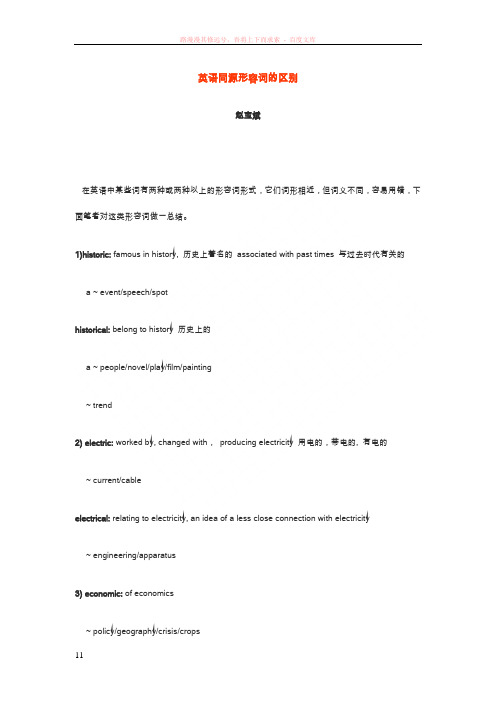
英语同源形容词的区别赵宝斌在英语中某些词有两种或两种以上的形容词形式,它们词形相近,但词义不同,容易用错,下面笔者对这类形容词做一总结。
1)historic: famous in history, 历史上著名的associated with past times 与过去时代有关的a ~ event/speech/spothistorical: belong to history 历史上的a ~ people/novel/play/film/painting~ trend2) electric: worked by, changed with,producing electricity 用电的,带电的, 有电的~ current/cableelectrical: relating to electricity, an idea of a less close connection with electricity ~ engineering/apparatus3) economic: of economics~ policy/geography/crisis/cropseconomical: careful in the spending of money and time, not waste 经济的,节俭的an ~ housewife/store4) industrial: of industries 工业的the ~ revolution/products/systemindustrious: hard-working, diligent~ people5) considerable: great much 相当多(大)的a ~ income/distanceconsiderate: thoughtful 体谅的,体贴的周到的She is ~ to others.6) sensible: reasonable, having good sense 实用的,明知的a ~ woman/idea/ 豁达的妇女/明知的观点~ clothes 实用的衣服sensitive: quick to receive impression 敏感的a ~ skin~ paper 感光纸7) continual: going on all the time without stopping or with only short breaks, stop and go repeatedly, 连续的,断断续续的~ rain/noisecontinuous: going on without a break, an uninterrupted flow 连续不断的~ fight/work8) intense: high in degree 强烈的,剧烈的,高度的~ heat炽热/painan ~ lady 热情的女子intensive: deep and thorough 精深的,集中的~ reading/study彻底研究/agriculture密集农业9)respectable: deserving respect, 值得尊敬的,有名望的a ~ man/professionrespectful: showing respect 尊敬人的,有礼貌的,He is always ~to the elders.respective: belongs to each of these 分别的,各自的They sat on their ~ chairs.10) imaginable: that can be imagined 可象想的~ difficultiesimaginary: existing only in the mind, unreal 想象中的,不真实的~ figureimaginative: of, having, using imagination 有想象力的,运用想象力的a ~ writer11) intelligent: having, showing intelligence, clever 有才智的, 聪明的an ~ looking girl ~ answerintelligible: clear to mind, that can be easily understood. 易了解的, 易领悟的an ~ speech/explanationintellectual: possessing a great deal of knowledge 知识的, 智力的12) contemptible: deserving contempt 可卑的a ~ liecontemptuous: showing contempt 表示轻视的a ~ look13) credible: that can be believed 可信的,可靠的a ~ witnesscredulous: too ready to believe things. 轻易相信的,易上当的He always cheats ~ people.creditable: that brings credit. 可称赞的a ~ record/deed/effort14) alternate: changing by turns 轮流的,交替的alternative: giving a choice between two things 选择的,两者选一的15) comparable 可比较的,有类似之处的comparative 比较而言的,相当的There is no scenery comparable to that of the West lake.He lived in comparative comfort recently.16) politic精明的political 政治的17) beneficial 有益的beneficent 多多行善的18) official 官方的officious 多管闲事的19) potent 强有力的potential 潜在的,可能的20) confident 有信心的,自信的confidential 机密的21) negligent 忽视的,粗心大意的negligible 可忽视的22) momentary 瞬时的,短时的momentous 重大的23) memorable 值得记忆的,不能忘却的memorial 纪念的24) social社会的sociable 善社交的25) childish 幼稚的childlike 孩子般的26) distinct: clear 明显的,清晰的distinctive: characteristic独特的,有区别的27) classic 一流的classical 古典的28) comprehensible 可理解的comprehensive 全面的,综合的29) disinterested 公平的uninterested 冷淡的30) earthly 人间的,尘世的earthy 泥土似的31) effective 有效的efficient 有效率的effectual 奏效的32) exceptionable 反对的exceptional 非凡的33) fatal 致命的fateful 决定性的34) fleshly 肉体的fleshy 肥胖的35) homely 家常的homelike 象家的36) im(un)practical 不切合实际的impracticable 无法使用的37) ingenious 有独创性的ingenuous 直率的,天真的38) manly 男人气派的male 男的masculine 男性的39) movable 可移动的,变动的mobile可动的,活动地40) mysterious 神秘的mystical 奥妙的41) notable 著名的(指事)noted 著名的(指人)42) Practical 实际的practicable 可行的,通行的43) regretful 遗憾的(指人)regrettable 遗憾的(指事)44) seasonable 及时的seasonal 季节的45) spiritual 精神的spirituous 酒精的46) tortuous 弯曲的torturous 受刑的47) transitory 短时间的(指事)transient 瞬时的(指人)48) elementary 基本的elemental 自然的49) healthy 健康的healthful 有易于健康的50) likely 可能的likable 可爱的51) desirable 合意的desirous 渴望的52)clean 干净的cleanly 有干净习惯的Are cats cleanly animals?53) kind 慈善地kindly 友好的,亲切的54) temporal 一时的, 暂时的, 世俗的temporary 暂时的, 临时的英语同源副词的区别赵宝斌在英语中,某些形容词词形同时也可作副词,但这些形容词还有加后缀-ly 副词的形式,因此这类词就有两种副词形式,它们在用法上有些可以互换,有些是有区别,下面笔者对这类词做一总结。
区别易混淆的副词、形容词
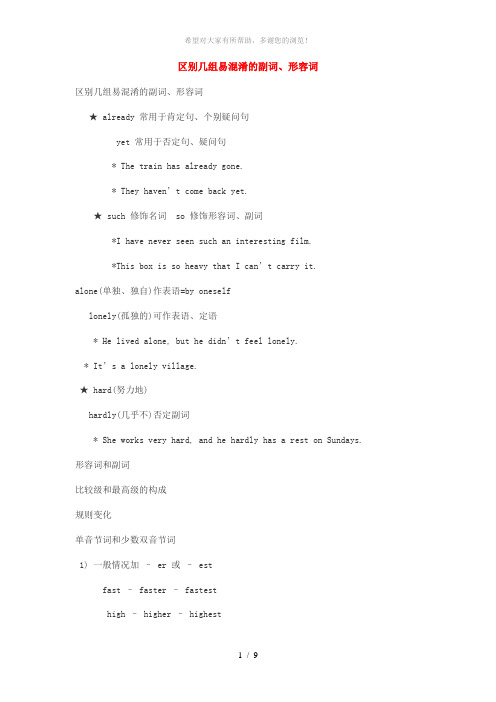
区别几组易混淆的副词、形容词区别几组易混淆的副词、形容词★ already 常用于肯定句、个别疑问句yet 常用于否定句、疑问句* The train has already gone.* They haven’t come back yet.★ such 修饰名词 so 修饰形容词、副词*I have never seen such an interesting film.*This box is so heavy that I can’t carry it.alone(单独、独自)作表语=by oneselflonely(孤独的)可作表语、定语* He lived alone, but he didn’t feel lonely.* It’s a lonely village. ★ hard(努力地)hardly(几乎不)否定副词* She works very hard, and he hardly has a rest on Sundays. 形容词和副词比较级和最高级的构成规则变化单音节词和少数双音节词1) 一般情况加– er 或– estfast – faster – fastesthigh – higher – highestclever – cleverer – cleverest 规则变化单音节词和少数双音节词2) 以字母 e 结尾加–r 或–stfine – finer – finestlate – later – latestnice – nicer – nicest规则变化单音节词和少数双音节词3) 重读闭音节、末尾只有一个辅音字母时双写加–er 或–estfat – fatter – fattestbig – bigger – biggestthin – thinner – thinnest规则变化单音节词和少数双音节词4) 以辅音字母加 y 结尾变 y为 i 加–er 或–estearly – earlier – earliesteasy – easier – easiestlucky – luckier – luckiest规则变化部分双音节和多音节词在词前加 more 或 mostslowly - more slowly - most slowlyeasily - more easily - most easilycarefully - more carefully - most carefully不规则变化good/well – better – bestmany/much – more – mostlittle – less – leastfar – farther – farthest( far – further – furthest )bad/badly/ill – worse – worst形容词和副词比较级和最高级的用法1)表示两者(人或事物)的比较时用比较级,通常用连词 than 引导,表示“较······”或“更······一些”的意思*This cake is more delicious than that one.*Li Lei jumped farther than Jim (did).2) 表示三者或三者以上(人或事物)的比较用最高级,最高级的前面一般要加定冠词the,后面可带of(in,among)短语来说明比较的范围*Shanghai is the biggest city in China.*Lucy sings (the) best of all.*He is the most careful among us.3) 在表示“和······一样······”和“不及······”这类概念时,可以用“as+原级+as”和“not as(so)+原级+as”的句型*Our teacher is as busy as before.*He does not run so (as) fast as I.4) 可用much, still, a little, even, far,three years等表示程度的状语来修饰比较级*She is much taller than Mrs.Liu.*He is three years older than I.*This problem is a little more difficult than the other one.5)几种比较级的使用句型1.“比较级 + and + 比较级”表示“越来越······”*Your English is getting better and better.你的英语越来越好了。
解决常见的形容词与副词混淆问题
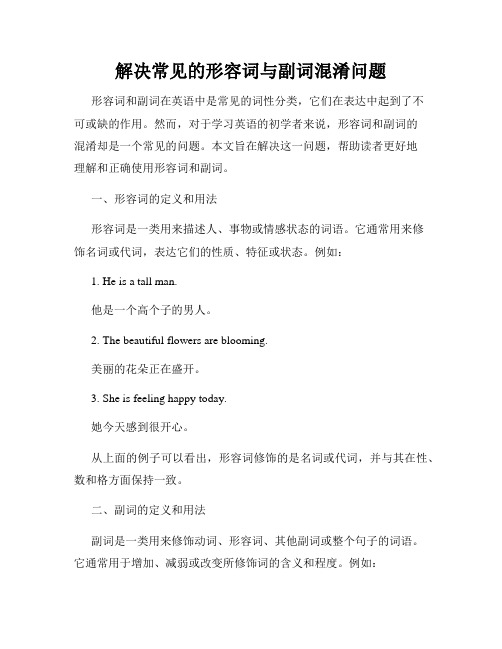
解决常见的形容词与副词混淆问题形容词和副词在英语中是常见的词性分类,它们在表达中起到了不可或缺的作用。
然而,对于学习英语的初学者来说,形容词和副词的混淆却是一个常见的问题。
本文旨在解决这一问题,帮助读者更好地理解和正确使用形容词和副词。
一、形容词的定义和用法形容词是一类用来描述人、事物或情感状态的词语。
它通常用来修饰名词或代词,表达它们的性质、特征或状态。
例如:1. He is a tall man.他是一个高个子的男人。
2. The beautiful flowers are blooming.美丽的花朵正在盛开。
3. She is feeling happy today.她今天感到很开心。
从上面的例子可以看出,形容词修饰的是名词或代词,并与其在性、数和格方面保持一致。
二、副词的定义和用法副词是一类用来修饰动词、形容词、其他副词或整个句子的词语。
它通常用于增加、减弱或改变所修饰词的含义和程度。
例如:1. He runs fast.他跑得快。
2. She sings beautifully.她唱得很美。
3. They are extremely friendly.他们非常友好。
从上面的例子可以看出,副词修饰的是动词、形容词或其他副词,并对其进行增强、减弱或改变程度的修饰。
三、形容词与副词混淆的常见场景1. 形容词与副词在形态上相同有一些形容词和副词在形态上是相同的,这就容易使人混淆。
例如:1) The sun shines bright.阳光照耀得很明亮。
2) She works hard.她工作很努力。
在这个例子中,bright同时可以作为形容词和副词,表示"明亮"的形容词和表示"明亮地"的副词;hard既可以表示"努力"的形容词,也可以表示"努力地"的副词。
2. 形容词和副词的词尾不同有一些形容词和它们对应的副词的词尾不同,这也容易导致混淆。
语法指南区分形容词与副词的常见错误
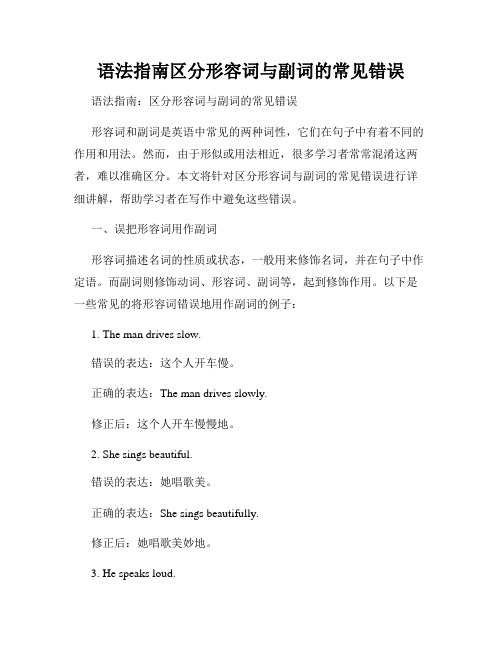
语法指南区分形容词与副词的常见错误语法指南:区分形容词与副词的常见错误形容词和副词是英语中常见的两种词性,它们在句子中有着不同的作用和用法。
然而,由于形似或用法相近,很多学习者常常混淆这两者,难以准确区分。
本文将针对区分形容词与副词的常见错误进行详细讲解,帮助学习者在写作中避免这些错误。
一、误把形容词用作副词形容词描述名词的性质或状态,一般用来修饰名词,并在句子中作定语。
而副词则修饰动词、形容词、副词等,起到修饰作用。
以下是一些常见的将形容词错误地用作副词的例子:1. The man drives slow.错误的表达:这个人开车慢。
正确的表达:The man drives slowly.修正后:这个人开车慢慢地。
2. She sings beautiful.错误的表达:她唱歌美。
正确的表达:She sings beautifully.修正后:她唱歌美妙地。
3. He speaks loud.错误的表达:他说话大声。
正确的表达:He speaks loudly.修正后:他大声地说话。
二、误将副词用作形容词有时候,一些学习者错误地将副词误用为形容词,以描述名词。
以下是一些常见的将副词错误地用作形容词的例子:1. She is a talentedly writer.错误的表达:她是一个有才华地作家。
正确的表达:She is a talented writer.修正后:她是一位有才华的作家。
2. The team played goodly.错误的表达:球队比赛打得好。
正确的表达:The team played well.修正后:球队比赛打得出色。
3. He walked quick.错误的表达:他走得快。
正确的表达:He walked quickly.修正后:他迅速地走了。
三、形容词和副词形式的转换在句子中,形容词和副词有时需要根据不同的表达需求进行形式的转换。
以下是一些常见的形容词和副词形式的转换例子:1. The weather is bad today.错误的表达:今天的天气糟糕。
形容词和副词的用法区别
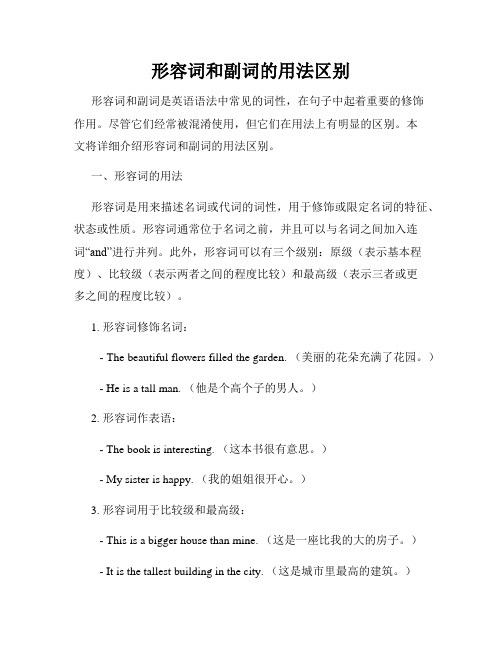
形容词和副词的用法区别形容词和副词是英语语法中常见的词性,在句子中起着重要的修饰作用。
尽管它们经常被混淆使用,但它们在用法上有明显的区别。
本文将详细介绍形容词和副词的用法区别。
一、形容词的用法形容词是用来描述名词或代词的词性,用于修饰或限定名词的特征、状态或性质。
形容词通常位于名词之前,并且可以与名词之间加入连词“and”进行并列。
此外,形容词可以有三个级别:原级(表示基本程度)、比较级(表示两者之间的程度比较)和最高级(表示三者或更多之间的程度比较)。
1. 形容词修饰名词:- The beautiful flowers filled the garden. (美丽的花朵充满了花园。
) - He is a tall man. (他是个高个子的男人。
)2. 形容词作表语:- The book is interesting. (这本书很有意思。
)- My sister is happy. (我的姐姐很开心。
)3. 形容词用于比较级和最高级:- This is a bigger house than mine. (这是一座比我的大的房子。
) - It is the tallest building in the city. (这是城市里最高的建筑。
)二、副词的用法副词是一种修饰动词、形容词、其他副词或整个句子的词性。
它可以用来表示方式、程度、时间、地点和频率等信息。
副词通常位于动词之前,但是在句子中的位置可以灵活调整。
1. 副词修饰动词:- She sings beautifully. (她唱得很美。
)- He drove carefully. (他小心地开车。
)2. 副词修饰形容词:- My sister is very beautiful. (我的姐姐非常漂亮。
)- The food is extremely delicious. (这食物太美味了。
)3. 副词修饰其他副词:- He speaks English quite fluently. (他英语说得相当流利。
- 1、下载文档前请自行甄别文档内容的完整性,平台不提供额外的编辑、内容补充、找答案等附加服务。
- 2、"仅部分预览"的文档,不可在线预览部分如存在完整性等问题,可反馈申请退款(可完整预览的文档不适用该条件!)。
- 3、如文档侵犯您的权益,请联系客服反馈,我们会尽快为您处理(人工客服工作时间:9:00-18:30)。
英语同源形容词的区别赵宝斌在英语中某些词有两种或两种以上的形容词形式,它们词形相近,但词义不同,容易用错,下面笔者对这类形容词做一总结。
1)historic: famous in history, 历史上著名的associated with past times 与过去时代有关的a ~ event/speech/spothistorical: belong to history 历史上的a ~ people/novel/play/film/painting~ trend2) electric: worked by, changed with,producing electricity 用电的,带电的, 有电的~ current/cableelectrical: relating to electricity, an idea of a less close connection with electricity ~ engineering/apparatus3) economic: of economics~ policy/geography/crisis/cropseconomical: careful in the spending of money and time, not waste 经济的,节俭的an ~ housewife/store4) industrial: of industries 工业的the ~ revolution/products/systemindustrious: hard-working, diligent~ people5) considerable: great much 相当多(大)的a ~ income/distanceconsiderate: thoughtful 体谅的,体贴的周到的She is ~ to others.6) sensible: reasonable, having good sense 实用的,明知的a ~ woman/idea/ 豁达的妇女/明知的观点~ clothes 实用的衣服sensitive: quick to receive impression 敏感的a ~ skin~ paper 感光纸7) continual: going on all the time without stopping or with only short breaks, stop and go repeatedly, 连续的,断断续续的~ rain/noisecontinuous: going on without a break, an uninterrupted flow 连续不断的~ fight/work8) intense: high in degree 强烈的,剧烈的,高度的~ heat炽热/painan ~ lady 热情的女子intensive: deep and thorough 精深的,集中的~ reading/study彻底研究/agriculture密集农业9)respectable: deserving respect, 值得尊敬的,有名望的a ~ man/professionrespectful: showing respect 尊敬人的,有礼貌的,He is always ~to the elders.respective: belongs to each of these 分别的,各自的They sat on their ~ chairs.10) imaginable: that can be imagined 可象想的~ difficultiesimaginary: existing only in the mind, unreal 想象中的,不真实的~ figureimaginative: of, having, using imagination 有想象力的,运用想象力的a ~ writer11) intelligent: having, showing intelligence, clever 有才智的, 聪明的an ~ looking girl ~ answerintelligible: clear to mind, that can be easily understood. 易了解的, 易领悟的an ~ speech/explanationintellectual: possessing a great deal of knowledge 知识的, 智力的12) contemptible: deserving contempt 可卑的a ~ liecontemptuous: showing contempt 表示轻视的a ~ look13) credible: that can be believed 可信的,可靠的a ~ witnesscredulous: too ready to believe things. 轻易相信的,易上当的He always cheats ~ people.creditable: that brings credit. 可称赞的a ~ record/deed/effort14) alternate: changing by turns 轮流的,交替的alternative: giving a choice between two things 选择的,两者选一的15) comparable 可比较的,有类似之处的comparative 比较而言的,相当的There is no scenery comparable to that of the West lake.He lived in comparative comfort recently.16) politic精明的political 政治的17) beneficial 有益的beneficent 多多行善的18) official 官方的officious 多管闲事的19) potent 强有力的potential 潜在的,可能的20) confident 有信心的,自信的confidential 机密的21) negligent 忽视的,粗心大意的negligible 可忽视的22) momentary 瞬时的,短时的momentous 重大的23) memorable 值得记忆的,不能忘却的memorial 纪念的24) social社会的sociable 善社交的25) childish 幼稚的childlike 孩子般的26) distinct: clear 明显的,清晰的distinctive: characteristic独特的,有区别的27) classic 一流的classical 古典的28) comprehensible 可理解的comprehensive 全面的,综合的29) disinterested 公平的uninterested 冷淡的30) earthly 人间的,尘世的earthy 泥土似的31) effective 有效的efficient 有效率的effectual 奏效的32) exceptionable 反对的exceptional 非凡的33) fatal 致命的fateful 决定性的34) fleshly 肉体的fleshy 肥胖的35) homely 家常的homelike 象家的36) im(un)practical 不切合实际的impracticable 无法使用的37) ingenious 有独创性的ingenuous 直率的,天真的38) manly 男人气派的male 男的masculine 男性的39) movable 可移动的,变动的mobile可动的,活动地40) mysterious 神秘的mystical 奥妙的41) notable 著名的(指事)noted 著名的(指人)42) Practical 实际的practicable 可行的,通行的43) regretful 遗憾的(指人)regrettable 遗憾的(指事)44) seasonable 及时的seasonal 季节的45) spiritual 精神的spirituous 酒精的46) tortuous 弯曲的torturous 受刑的47) transitory 短时间的(指事)transient 瞬时的(指人)48) elementary 基本的elemental 自然的49) healthy 健康的healthful 有易于健康的50) likely 可能的likable 可爱的51) desirable 合意的desirous 渴望的52)clean 干净的cleanly 有干净习惯的Are cats cleanly animals?53) kind 慈善地kindly 友好的,亲切的54) temporal 一时的, 暂时的, 世俗的temporary 暂时的, 临时的英语同源副词的区别赵宝斌在英语中,某些形容词词形同时也可作副词,但这些形容词还有加后缀-ly 副词的形式,因此这类词就有两种副词形式,它们在用法上有些可以互换,有些是有区别,下面笔者对这类词做一总结。
一般地说,可以互换的这类词,形容词词形的副词表示比较具体的概念,经常用语口语中,不太正式;后缀-ly形式的副词,表示比较抽象的概念,有引申义,并有一定感情色彩,变副词比较级时,用此类副词,如修饰动词和分词,放在它们前面。
1) cheap: often used instead of cheaply, esp. in casual conversation and with verbs like buy and sellDo you like this shirt? I bought it really cheaply.cheaply: I can't sell you more cheaply.2) clean: completely, used with (1) verb forget (2) the proposition over, through (3) adv away outI ~ forget. The ball sailed ~ over the roof.The prisoner got ~ away. I am afraid I am clean out of food.cleanly: precisely in a clean manner, often used with v cut.He caught the ball ~ . The doctor cut ~ through the abdominal wall.3) clear: not touchingPlease stand clear of the gate.clearly: distinctly, obviously, similar to the meaning of clearI can't see ~ without my glasses.We ~need to think again.4) close: nearCome close, I want to tell you something.closely: carefully, with great attentionStudy this ~ it's very important.5) dead: exactly completely, used in certain expressions~ right, ~ sure, ` tired, ~ slow, ~ ahead, ~ drunk, ~ straightdeadly: fatallyHe was ~ injured in the crash.6) direct: used instead of directly in talking about journeys and timetablesThe plane goes ~ from London to Houston.7) easy: used in certain expressionsTake it easy. easy come, easy go.Easier said than done.easily:I can do very easily.8) fair: used in the expression play ~, fight ~fairly: justly, honestlyYou must do it ~.9) fine: well, used in some expressionsThat suits me fine. You are doing ~.finely: elaborately (细微地)(not commonly usedHe studied it very finely.10) free: without paymentYou can't eat ~ in my restaurant.freely: without limit or restriction(限制)You can't speak ~ in front of my father.11) hard: to show degreeHe hit hard.hardly: almost not12) high: it refers to high position.Don't go higher. It is dangerous.highly: it refers to an extreme degree "very much".She is ~ paid. It is ~ amusing.13) just: a moment ago I have just come here.justly: in accordance with justice or the law.You must do it justly.14) late: not on time He hates arriving late.lately: recently I haven't heard from you lately.15) loud: used instead of loudly in informal conversation with the verbs talk, speak, shout, laughloudly: in a big voice They quarreled ~.16) low: in a small voice Can you speak low?lowly: in a humble way Don't speak to him lowly.17) most: very Which do you like most?mostly: mainly, most often, in most cases18) pretty: rather ~ well, ~ soonprettily: pleasing to people (悦人地)He danced ~.19) quick: in informal English used instead of quickly quickly He acted ~.20) real: in informal English used instead of reallyreally: Are you ~ tell me the truth.21) right: just, exactly, all the wayThe ball hit me ~ in the nose.He arrived ~ after breakfast.Turn right at the traffic lights.rightly: correctly right can be used informally instead of rightly You guessed right(ly)22) sharp: punctually 准时地 He arrived at six o'clock ~.sharply: 锐利地,急剧地look ~ speak ~23) short: suddenlyThe car stopped suddenly.shortly: soon He will come shortly.24) slow: used in informal conversation instead of slowlygo ~, drive ~25) sound: 彻底地used in the expression sound asleepsoundly: 非常好地He is sleeping soundly.26) straight and straightly used in the same way.27) sure: used in American English meaning certainlysurely: He speaks very surely.28) tight: used instead of tightly in informal conversation.hold ~, pack ~. The door was shut ~.tightly: We'd better sit tightly.29)wide: He opened his eyes wide.widely: in many different placesHe has traveled widely.30) wrong used instead of wrongly in informal conversation.You guessed wrong(ly)容易混淆拼错的英语词赵宝斌在英语中,有些单词的拼法很相似,容易混淆,下面笔者总结了这类的词。
